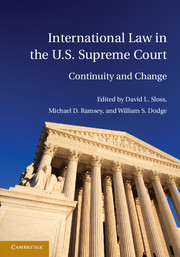Book contents
- Frontmatter
- Contents
- List of Contributors
- Table of Cases
- Acknowledgments
- Introduction
- PART I FROM THE FOUNDING TO THE CIVIL WAR
- PART II FROM THE CIVIL WAR TO THE TURN OF THE CENTURY
- PART III FROM THE TURN OF THE CENTURY TO WORLD WAR II
- PART IV FROM WORLD WAR II TO THE NEW MILLENNIUM
- 10 Treaties in the Supreme Court, 1946–2000
- 11 Customary International Law in the Supreme Court, 1946–2000
- 12 International Law as an Interpretive Tool in the Supreme Court, 1946–2000
- 13 Global Power in an Age of Rights: Historical Commentary, 1946–2000
- PART V INTERNATIONAL LAW IN THE U.S. SUPREME COURT IN THE TWENTY-FIRST CENTURY
- V.A TREATIES AFTER 2000
- V.B CUSTOMARY INTERNATIONAL LAW AFTER 2000
- V.C INTERNATIONAL LAW AND CONSTITUTIONAL INTERPRETATION AFTER 2000
- V.D INTERNATIONAL LAW AND STATUTORY INTERPRETATION AFTER 2000
- V.E INTERNATIONAL LAW AND THE WAR ON TERROR
- VI CONCLUSION
- Index
- References
11 - Customary International Law in the Supreme Court, 1946–2000
Published online by Cambridge University Press: 05 July 2011
- Frontmatter
- Contents
- List of Contributors
- Table of Cases
- Acknowledgments
- Introduction
- PART I FROM THE FOUNDING TO THE CIVIL WAR
- PART II FROM THE CIVIL WAR TO THE TURN OF THE CENTURY
- PART III FROM THE TURN OF THE CENTURY TO WORLD WAR II
- PART IV FROM WORLD WAR II TO THE NEW MILLENNIUM
- 10 Treaties in the Supreme Court, 1946–2000
- 11 Customary International Law in the Supreme Court, 1946–2000
- 12 International Law as an Interpretive Tool in the Supreme Court, 1946–2000
- 13 Global Power in an Age of Rights: Historical Commentary, 1946–2000
- PART V INTERNATIONAL LAW IN THE U.S. SUPREME COURT IN THE TWENTY-FIRST CENTURY
- V.A TREATIES AFTER 2000
- V.B CUSTOMARY INTERNATIONAL LAW AFTER 2000
- V.C INTERNATIONAL LAW AND CONSTITUTIONAL INTERPRETATION AFTER 2000
- V.D INTERNATIONAL LAW AND STATUTORY INTERPRETATION AFTER 2000
- V.E INTERNATIONAL LAW AND THE WAR ON TERROR
- VI CONCLUSION
- Index
- References
Summary
The story of customary international law in the Supreme Court from 1946 to 2000 is one of both continuity and change. In cases involving the laws of war and state boundary disputes, the Court continued long traditions of interpreting and applying customary international law. But in its most important decision of the period – Banco Nacional de Cuba v. Sabbatino – the Court drew back from deciding an issue of customary international law, finding the international law of expropriation too unsettled. Sabbatino was initially seen as a setback for the direct application of customary international law by federal courts. But ironically, it would provide a foundation for a new line of cases directly applying international human rights law, which would begin in the lower courts during this period and finally reach the Supreme Court just after its close. Pouring new wine into an old bottle, the federal courts used the jurisdiction granted by the 1789 Alien Tort Statute to apply a customary international law unknown in the eighteenth century.
Customary international law was changing during this period. The high positivism of the early twentieth century receded, and arguments based on natural law gained at least a little ground, particularly in the areas of war crimes and human rights. Traditional customary international law rules on the expropriation of alien property came under attack from Communist and newly independent nations, making those rules seem to the Supreme Court unfit for adjudication.
- Type
- Chapter
- Information
- International Law in the U.S. Supreme Court , pp. 353 - 379Publisher: Cambridge University PressPrint publication year: 2011
References
- 2
- Cited by



